- Home
- Lisa Wingate
The Language of Sycamores Page 3
The Language of Sycamores Read online
Page 3
I cleared my throat, walking into the kitchen for a glass of water. “No. It’s just been kind of a tough day.”
“Oh . . .” She hesitated, not sure what should come next. “Well . . . is there anything I can do?”
Part of me longed to tell her everything, but part of me wouldn’t do it. Part of me was still the big sister who had to know the most and be the best at everything, especially in front of her. “No. But thanks for asking.” You’re being stubborn, Karen. You know you’re being stubborn. You could use someone to talk to. I knew Kate would be sympathetic. She would listen. Kate was always a good listener. Kate was good at everything. Disgustingly perfect. Always. “So what’s the deal with these long-lost relatives? I didn’t catch all of that. I was playing the piano.”
“You were . . . I didn’t know you played the piano anymore,” she said. I had inadvertently clued Kate in to the fact that something was very wrong. Kate had Grandma Rose’s nose for trouble. “I didn’t even know you had a piano.”
“It came with the loft. Antique.” I quickly turned the subject back to harmless small talk. “So what’s the deal with these cousins? I know you told me before, but I can’t even remember how we’re related.”
Kate exhaled audibly, no doubt frustrated that I hadn’t been keeping up with the family genealogy. She’d e-mailed me the details once or twice, even forwarded a note from one of the long-lost cousins. Now that Grandma Rose was gone and Kate was living at the old farm, she had become the official keeper of family memorabilia and lost cousins, and that was fine with me.
She gave me the Reader’s Digest condensed version of our family history. “Their grandmother Augustine Hope was Grandma Rose’s sister. So they’re second cousins to us, or something like that. I’m not sure ex-actly what you’d call it. Anyway, the youngest granddaughter, Jenilee, was going through some things from her grandparents’ house, and she found a box of old letters between our grandma Rose and her grandmother, Augustine Hope. She’s going to bring those when she comes. It’ll be interesting to look at that old stuff.”
Long-lost relatives and old letters. Kind of high drama for our family. “Did you ask Dad anything about it? I mean, maybe there was a reason Grandma Rose never mentioned these people, Kate.” Her name slipped out with just a little too much big-sister tone, and I knew right away that she was going to take offense, so I rushed on. “I’m sorry. I didn’t mean to sound critical. It’s just been a tough day.”
Kate paused a minute, and I was afraid she was going to ask again what was wrong. “That’s all right,” she said finally. “I admit it sounds strange. Dad doesn’t really know anything about Grandma’s sisters. He remembers knowing her brothers when he was young, but her sisters were a taboo subject. I thought I’d met one years ago at a family reunion, and seen old pictures, but Dad says those were her cousins. Grandma had no contact with a sister.”
An unexpected sense of mystery tickled the back of my mind, and for a moment I forgot everything I had been thinking about. “That’s odd, isn’t it?”
“I thought so.” Kate was pleased that, for a change, we were on the same wavelength. “I know family history isn’t really your thing, but I thought maybe . . . well, since James was going to be here this weekend anyway, maybe you’d just get a wild urge to use one of those free airline tickets and fly out for the weekend—or longer, if you can get away. We’d love to have you.”
Or longer, if you can get away. Get away. Right now that seemed like exactly what I needed—to get away. “I’m coming,” I blurted.
“Oh . . . weh . . . well . . . great,” Kate stuttered, surprised nearly speechless, no doubt because in the past two years since Grandma Rose’s funeral, I hadn’t been back to the farm even once. Kate invited and I made excuses, even to James, who had begun making a habit of taking his layovers in Kansas City so he could drive to the farm and spend time bonding with the piece of land we’d inherited from Grandma.
“I’ll throw a suitcase together and get a flight out tonight.” Even as I said the words, I couldn’t believe I’d actually go through with it.
Kate clearly couldn’t either. “Great,” she stammered. “Ben can come pick you up.”
“No, don’t worry about that.” I hurried up the iron staircase to the bedroom and started throwing clothes onto the bed in a haphazard pile. “I’ll get a rental car. The free passes are standby, so it’s hard to tell when I’ll get into Kansas City. It could be tomorrow morning, even. I’ll just see you when I get there. I’ll leave a message on James’s cell to let him know I’m coming.”
“Great,” Kate repeated. I guess she didn’t know what else to say. “Well, listen, we’ll see you when you get here.”
“See you then.” Yanking the suitcase out of the closet, I tossed in clothes with the carelessness of someone running away from home.
Kate didn’t say good-bye but hung on the line, silent for a moment. Then she sighed and said, “Karen, is everything all right?”
“Yes. Fine. I could just use a few days out of the city.” A lie, but a pretty good one.
It seemed to convince Kate. She laughed on the other end of the phone. “Well, we’re definitely out of the city. You know, we still barely even have e-mail service out here.”
“Well, forget it, then.”
Kate took me seriously. “You can check your e-mail at the church office in town,” she rushed out.
“Kate, I was kidding.” The two of us actually chuckled. Together.
“I knew that,” she quipped. “See you tomorrow, then.”
“See you tomorrow.” I hung up the phone, and all of a sudden I was looking forward to arriving at the one place I never wanted to be. Suddenly, the farm seemed like the music from the old piano—a refuge, a place so far away from my normal life that the problems and the questions couldn’t find me there. I could get away for now and put all of it off until Monday. Closing the suitcase, I hurried to the bathroom, threw a few things into the travel bag I kept packed for business trips, and headed for the door.
I was at the airport, slipping into a seat in the tail section of a plane, before it occurred to me that I was acting crazy. A flash of panic bolted through me like lightning from the storm that had vanished over the ocean. Running away wasn’t going to solve anything. I needed to go home, make phone calls, formulate plans, look over our finances. Make an appointment at Dr. Conner’s office. I should get off the plane while it’s still at the gate.
But I didn’t. Instead, I called James’s cell phone and waited, breathless, while it rang. His voice mail picked up, and I was glad. I wasn’t ready to talk about the bad news of the day. Talking about it would make it more real.
I left a message for James, trying to sound as if my spur-of-the-moment visit to the farm were a perfectly normal thing. “Hi, honey. Change of plans for the weekend. Kate called and said you were going to layover at the farm, so I decided to catch a flight there for a couple days.” As soon as James got the message, he would know something was up. It wasn’t like me to suddenly decide to go to the farm. I considered telling him about the Lansing layoffs via voice mail, but then I realized that wasn’t a good idea. He would show up at Kate’s and want to talk about it, and then everyone would know.
Everyone’s going to have to know, Karen. Why did that bother me so much? Why didn’t I want anyone to know about the layoffs or the test results at Dr. Conner’s office?
Someone sat down in the seat beside me and I glanced away from the window.
Stuffing his backpack under the seat, he smiled. “Hey. How are you?” He was young, probably a college kid, wearing a Les Paul T-shirt, with his light brown hair pulled back in an unkempt ponytail.
“Fine, thanks,” I said, turning back to the window. I didn’t feel like talking, especially not to some college-aged rebel without a cause.
“So where ya headed?” He fished around in his backpack and came out with a Snickers bar.
“Kansas City.”
“Cool.” He s
ounded surprised. “Me too. You visiting someone there?”
“In Hindsville,” I replied flatly, still hoping he would get the hint and decide to talk to the guy in the aisle seat instead of me.
“Hey, I know Hindsville.” I realized I’d said the wrong thing. Now we had something in common—a reason to chat. “We did a performance there last summer—at the park with the bandstand. You know, the one right downtown on the square?”
It seemed odd to hear “downtown” and “Hindsville” in the same sentence. Curiosity nudged me out my sullen mood, and I found myself asking, “In Hindsville? A performance of what?” I couldn’t imagine what this shaggy-haired kid with the loop in one ear would be doing in a conservative Baptist bastion like Hindsville.
“Jumpkids,” he answered, as if it were self-explanatory. “Ever heard of it?”
I shook my head. He seemed disappointed, and for some reason, I felt bad. “No, but I don’t get to Missouri much.”
“Oh, we’ve got groups all over the country. Our foundation is actually headquartered in New York.” He sounded like he was trying to sell me something. “We set up summer mini camps for kids who don’t have much to look forward to when school’s out—teach them music, art, dance, theater. Give them something to keep them off the streets, something to feel good about, you know? We finish up by doing a musical theater performance. I teach theater and guitar, and last year, baseball, but the music is really my thing. I’m not sure what I’ll teach this year or which towns we’re going to. Some of the schools are out earlier than usual, so that changed the schedule.” He extended his hand to shake mine. “Keiler Bradford, by the way. Nice to meet you.”
“Karen Sommerfield,” I replied. “That’s great about the music program. Sounds like a really good thing.” I honestly meant it. There was a sense of enthusiasm, a sparkle in his eyes that was contagious—the diamondlike luster of a true believer with a noble cause. “So is this a full-time job for you, or do you just do this in the summers?”
“Just summers.” He paused for a minute, his lips pursed thoughtfully as he glanced out the window, watching the plane shove away from the gate. “This’ll be my last year, I guess. I’m a senior at NYU, so after this summer, I’m off to the real world. Unless I decide to go to seminary. I’m really not sure where I go from here. I may just take next winter off—maybe get on at a ski resort, work the lifts by day, play music by night. That kind of thing.”
I smiled at the aimless uncertainty of youth. I couldn’t remember ever being as lost as Keiler. The very idea of spending years in seminary or summers traveling around spreading music and goodwill was completely foreign to my experience. In my family, everything had to have a purpose, everything had to be part of the plan.
“Hey, I’d stay in school,” I said, but I couldn’t believe I was giving him that advice. How many times had I told summer interns at Lansing the exact opposite? Get your degree, get out, get on-the-job experience, start climbing the ladder. “The real world stinks.”
Keiler looked shocked. The nice lady in seat 21A is a cynic.
His expression made me chuckle, and I felt a need to apologize. “I’m sorry. It’s been a pretty rotten day so far.”
“Oh,” he said, seeming relieved. Apparently, I didn’t look like a cynic.
Our conversation paused while the flight attendant went through the safety procedures. By the time she was finished, the plane was in position on the runway. The attendant sat down, the pilot announced takeoff, and the plane rocketed down the runway and into the darkening evening.
I was on my way to Missouri, and all of a sudden, I panicked again. What in the world was I doing? What would I do when I got to the farm—make small talk for two days, act like nothing was wrong? I didn’t want to talk to anybody, much less my sister and a long-lost cousin I’d never even met.
Worse than that, I didn’t want to go back to the farm. Ever. I hadn’t admitted that to anyone. I’d just made excuses every time Kate invited me. When she called about having a family gathering or getting together for a holiday, I told her I was tied up with work or that I had a business trip. She’d say that she understood, but somewhere behind the words there was a wounded sound. Kate had a vision of all of us back together as a family—the kind of family that flew home for holidays and christenings, that sent cards and called for the weekly chitchat. She hated that I wasn’t falling in line with her plan. Or maybe she didn’t hate it as much as she was disappointed by it.
She took it personally, I knew. The truth was that it didn’t have a thing to do with her. It didn’t have a thing to do with the fact that, at some point in my teenage years, I’d affirmed a growing suspicion that Hindsville was the most boring place on Earth. Compared to the happening scene in Boston, where my parents’ involvement in our lives seldom went beyond report-card checks and recital attendance, Grandma Rose’s constant scrutiny was agonizing. Her desire to teach us to cook and sew and can vegetables seemed out of step and largely ridiculous, considering that we lived in a posh row house in Boston, where we could walk in Boston Garden, but there wasn’t a vegetable patch within ten miles.
My reluctance to return to the farm now had nothing to do with how I’d felt about it in the past. It had to do with me and Grandma Rose and the last time I saw her. The day she passed away.
I hadn’t told anyone about that.
That day, she lay silent on the bed in the farmhouse, all of us gathered around her. She opened her eyes just before she passed from this world to the next, and she looked at me, and I swear she said my name. I glanced around the room, and it was obvious that no one else heard it. Then I looked back at Grandma, and she said, “There’s a whisper in the sycamores—can you hear it?”
I had no idea why she would say that in those last moments of her life—to me and only to me. No one else flinched or looked up or noticed. She’d used the phrase from time to time over the years, when she had a little secret and she wanted to tease us with it. “I heard a whisper in the sycamores,” she’d say. “They told me someone is about to have a birthday. They told me it’ll come a snow tomorrow. They told me someone’s found a special boy. . . .”
Whenever Grandma heard a whisper in the sycamores, it meant something was going to change and she knew what it was. As I sat there watching her on her deathbed, I wondered what she’d heard this time, and I knew it was too late to find out.
Oh, God, right then, I wished I had listened before. I wished I’d sat in her kitchen and snapped peas or sliced okra or peeled potatoes all those years I was young and she was full of stories. I wished I’d come to her bedside those last few months, sat with her as Kate did, and listened to her speak in barely a whisper. But I didn’t, and that last day, I lowered my face into my hands and wept, because it was too late.
One such realization should be enough to change your focus, but I was always way too much like Grandma Rose. Stubborn. Proud. Set in my ways. I cried like a baby the day we buried her; then I went back home to my normal life. In my mind, she was still at the farm, gathering onions and picking blackberries, baking pies, bread, and banana-nut cookies. She wasn’t gone, and she hadn’t delivered that silent message to me.
The truth was that I hadn’t returned these past two years because I was afraid. That moment at her deathbed had knocked me off my rock-solid foundation, and I didn’t like the way it felt. I didn’t want things to change. Change was not welcomed. In the business of wires and switches, bits and bytes, uncertainty is the enemy. You must know where every bit of information is coming from, where it’s going, and what it means. There can be no nebulous whispers.
Now, sitting on the airplane speeding toward the farm, I wondered if Grandma knew that changes were coming, whether I wanted them or not. Had she been trying to prepare me?
“So, you want to talk about it?” Keiler leaned his head against the headrest, his face sympathetic, soft, filled with the hopeful sense of someone who thought he could save the world and the cynical fortyish lady in seat 21
A.
I sighed. “It’s a long story.”
“I know.” He smiled and glanced at his watch. “I’ve got . . . one hour and forty-seven minutes.” He held out the smashed candy bar. “Want a Snickers?”
I couldn’t help smiling. Something about his laid-back, raveled-jeans, ponytail-wearing presence was comforting. “You know what? I do.”
I took the candy bar, and he pulled another from his bag, and the two of us sat eating Snickers like old friends. I realized I hadn’t eaten all day. The knot in my stomach began to work its way out, and all of a sudden, I started talking. I sat there on an airplane headed to the last place I wanted to go, with a stranger who looked like the last person I’d ever want to know, and I told him everything. I started with the doctor’s appointment, went through the management meeting, and ended with me wildly playing the piano for the first time in fifteen years.
As the plane was touching down in Kansas City, I finished by telling him about Kate’s call. “And you know, my mind was saying no, but the next thing I knew I was telling her I was coming. I don’t even know why I said it. I don’t know why I’m going. I think I’m having a breakdown.”
Keiler smiled. He wasn’t a good-looking kid, but there was a serenity, a kindness in him that made him beautiful. “I think we all want to head home when there’s trouble,” he said with calm assurance. “Sometimes you need that soft place to fall. That’s your family, your faith. The stuff that doesn’t change when everything else does.”
“Yeah, I guess so.” It seemed he had a wisdom I lacked. Strange, considering how young he was. “You know, you really ought to think about seminary school. You’re good at this.”
He squinted like he wasn’t quite sure I was serious. “I might. You know, right now I’m just waiting to see. I almost died two years ago during surgery, and I guess that changed how I feel about things. I’m not in such a big hurry to get from one place to another anymore. Once you learn that you can never really plan your destination, you stop worrying so much about being on the map. I figure I’m still here for a reason, and that reason could be anywhere, you know?”

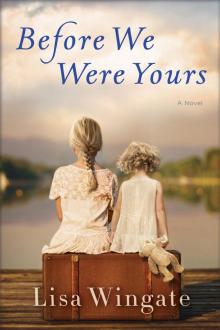 Before We Were Yours
Before We Were Yours A Sandy’s Seashell Shop Christmas
A Sandy’s Seashell Shop Christmas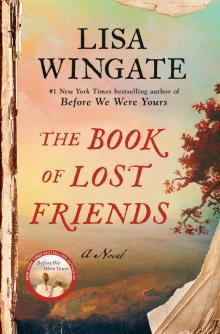 The Book of Lost Friends
The Book of Lost Friends Larkspur Cove
Larkspur Cove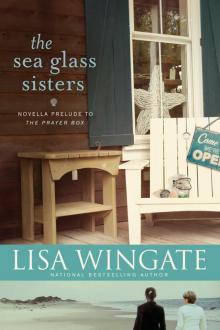 The Sea Glass Sisters
The Sea Glass Sisters The Language of Sycamores
The Language of Sycamores Dandelion Summer
Dandelion Summer Word Gets Around
Word Gets Around Beyond Summer
Beyond Summer Firefly Island
Firefly Island The Tidewater Sisters: Postlude to The Prayer Box
The Tidewater Sisters: Postlude to The Prayer Box Talk of the Town
Talk of the Town![Blue Sky Hill [01] A Month of Summer Read online](http://i1.bookreadfree.com/i1/03/29/blue_sky_hill_01_a_month_of_summer_preview.jpg) Blue Sky Hill [01] A Month of Summer
Blue Sky Hill [01] A Month of Summer A Thousand Voices
A Thousand Voices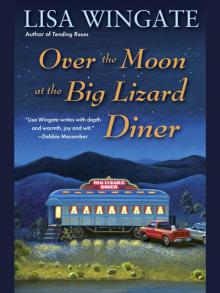 Over the Moon at the Big Lizard Diner
Over the Moon at the Big Lizard Diner Never Say Never
Never Say Never Good Hope Road
Good Hope Road The Summer Kitchen
The Summer Kitchen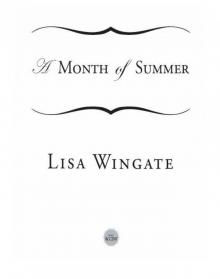 A Month of Summer
A Month of Summer Blue Moon Bay
Blue Moon Bay Drenched in Light
Drenched in Light The Sea Keeper's Daughters
The Sea Keeper's Daughters